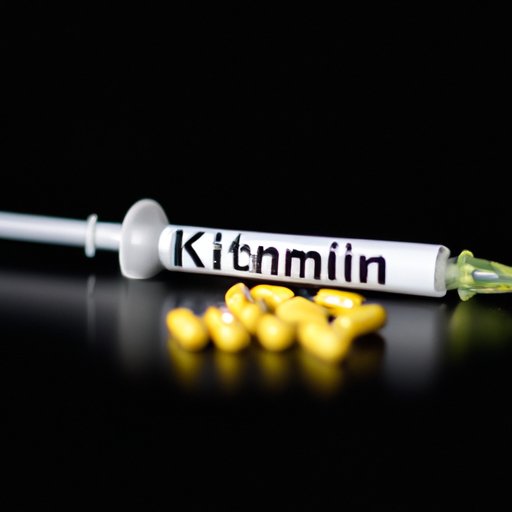
Introduction
As a new parent, you may have heard about the importance of vitamin K for your newborn. Some may wonder what vitamin K is, and why it is essential for a newborn baby. In this article, we will discuss the primary reasons why newborns need vitamin K and explore the science behind it. We’ll also delve into some myths and controversies surrounding vitamin K administration for newborns.
Exploring the Importance of Vitamin K for Newborns: Why it’s Administered and What it Does
Vitamin K is a fat-soluble vitamin that plays a critical role in helping the blood clot. It is involved in the production of factors that help the blood to coagulate and stop bleeding. Newborns are at particular risk of vitamin K deficiency as they do not get enough of it in the womb, and their gut bacteria is not yet mature enough to produce it adequately.
Because vitamin K is necessary for the blood clotting process, a deficiency can cause excessive bleeding or bleeding disorders, particularly in the brain or intestines. Bleeding in these areas can lead to severe long-term complications, such as brain damage, and can even be fatal.
Therefore, vitamin K administration for newborns is crucial to prevent bleeding disorders and ensure optimal health in the early stages of life.
Vitamin K: The Lifesaving Injection for Newborns
It is recommended that all newborns receive an injection of vitamin K shortly after birth. The injection is usually given in the muscle of the baby’s thigh. This delivery method ensures that vitamin K is absorbed into the bloodstream swiftly. The vitamin K injection is a safe and standard procedure that is offered to all newborns.
Studies show that vitamin K injection is highly successful in preventing bleeding disorders in the newborn period. According to the Centers for Disease Control and Prevention, the incidence of bleeding due to vitamin K deficiency has decreased by more than 90% since routine vitamin K administration was initiated in the 1960s.
Why Do Newborns Need Vitamin K? A Deep Dive into the Science Behind It
The science behind why newborns need vitamin K is complex, but it is essential to understand. Vitamin K plays a vital role in the blood clotting process, and newborns do not receive enough of it through the placenta. Newborns also have low levels of vitamin K in their bloodstream, and their gut bacteria are not yet developed enough to produce enough vitamin K.
When a newborn baby suffers from a vitamin K deficiency, they are at risk of experiencing several different types of bleeding. These may include bruising under the scalp (cephalohematoma), bleeding in the brain (intracranial hemorrhage), or bleeding into the intestines (GI hemorrhage).
Intracranial hemorrhage can be particularly severe and may cause long-term neurological complications. GI hemorrhage can lead to severe anemia, and the baby may require blood transfusions or other medical interventions.
A deficiency of vitamin K is preventable with injection of vitamin K immediately after birth. Research shows that administration of vitamin K significantly decreases the risk of bleeding disorder in newborns.
The History and Evolution of Vitamin K Administration for Newborns
Vitamin K was discovered in the 1920s by Danish scientist Henrik Dam. Until that point, the cause of bleeding disorders was unknown. Shortly after its discovery, vitamin K was used to treat bleeding disorders in adults.
The administration of vitamin K for newborns was found to be incredibly successful in preventing bleeding in the brain and other areas. Since then, recommendations for vitamin K administration to newborn babies have been adopted worldwide to prevent vitamin K deficiency bleeding (VKDB).
Over time, the dose, timing, and method of administration have evolved. The current recommendations are for an intramuscular injection of vitamin K immediately after birth or an oral dose of vitamin K for babies not receiving breast milk or for those who are exclusively breastfed but not receiving regular vitamin K supplementation.
The Controversy Surrounding Vitamin K Shots for Newborns: Separating Fact from Fiction
Myths and misunderstandings about vitamin K administration for newborns continue to persist, despite overwhelming scientific evidence supporting its safety and efficacy. Some parents are fearful of giving their babies vitamin K, believing that it may cause cancer, allergies, or other adverse reactions.
However, studies have shown that vitamin K administration is safe and well-tolerated for newborns. There have been no reports of an increased risk of cancer or other adverse reactions from vitamin K injections. The potential risks of refusing vitamin K injection for newborns far outweigh any hypothetical ones.
The refusal of vitamin K injection may also result in bleeding disorders and severe complications that could be life-threatening for the baby. According to a study published in the Journal of Pediatrics, babies whose parents declined vitamin K injection were at an increased risk of developing dangerous bleeding disorders.
Conclusion
Vitamin K administration for newborns is crucial to ensure optimal health and prevent bleeding disorders that could cause devastating complications. The science behind why babies need vitamin K is complex, but the benefits of its administration early in life have been extensively researched and supported.
As parents, it’s essential to understand the safety and efficacy of vitamin K administration to newborns and to consult with a medical professional about the best course of action for your baby. By doing so, you’re taking the first step in providing your child with the best possible start in life.




